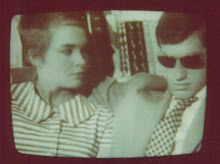Andrew Wagner’s film features Professor Leonard Schiller (Frank Langella), an aging novelist with failing health who encounters Heather (Lauren Ambrose) a young, attractive and ambitious grad student who has her heart set on writing her thesis about Leonard’s work.
Set before the backdrop of the New York City world of literature and publishing, he is focused upon completing what is to be his last novel. He tells Heather that her thesis project would simply be an unnecessary distraction. She is peristant, though--eventually proves herself to be a worthy candidate for the task, as she is an excellent student of his work. He begins to be flattered by her attention and she soon convinces him that this could revive his fading career and perhaps add some much-needed sparkle to his quiet life. He agrees to grant her a few interviews.
Meanwhile, his only daughter, Ariel (lily Taylor), a former dancer who is now a pilates and yoga instructor, is approaching 40 and desperately wishes to have a child before it is too late. Leonard wonders if her upbringing has anything to do with her ongoing distress on this front. The man she loves wants no part of it and the man who loves her leaves her cold.
Leonard’s publisher tells him that the only books they are accepting these days are celebrity confessionals and self-help books. He views himself more and more as a dying breed of writer. There is a sadness about him that intrigues Heather. We learn that his wife had been a psychotherapist who had died when Ariel was quite young. He reveals…”I would not be a writer if I had been blinded by optimism.”
Heather continuously digs to find out more about the connection between the wife and several of the author’s female characters. She wonders how much is autobiographical. Leonard finds this inquiry exhausting. It shakes the safety of his small world. She claims that his early work saved her life during a troubling time several years ago. The strength of his female characters and the freedom in his relationships left an impression.”You gave me the courage to live my own life.”
Leonard tells her that “freedom is not the choice that the world encourages—you have to wear a suit of armor to defend it.”
Heather refers to Hemingway’s premise that writers have threads of gold that run through their work—it makes up a solid gold bar. She is in search of Leonard’s “gold bar."
Heather confides some of her doubts about Leonard's later work to a well-regarded editor at the Village Voice who encourages Heather to speak the truth even if people get hurt and advises “When you speak with conviction, people notice.”
The relationship between Heather and Leonard becomes complex…he seems to enjoy his role as mentor for Heather as she is formulating her perspective on his work. There is a touch of the romantic, but she completes the project and his health problems escalate.
Leonard tells his daughter that the thesis is "half-baked," but he truthfully respects what Heather has to say. Ariel arrives in a much happier place in her life. Leonard continues to struggle with comletion of his last novel.
This is a quiet and touching story about modern life, aging, love, and art—worth watching.
7/24/11
Subscribe to:
Post Comments (Atom)






No comments:
Post a Comment